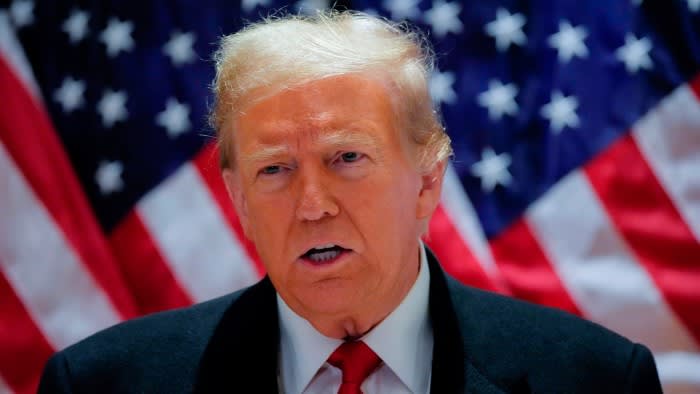Unlock the Editor’s Digest for free
Roula Khalaf, Editor of the FT, selects her favourite stories in this weekly newsletter.
Donald Trump has been banned from making disparaging statements about potential witnesses, jurors or prosecutors in his upcoming “hush money” trial, after a judge ruled the former US president’s posts could torpedo the case.
The order came just hours after Trump attacked Juan Merchan, the Manhattan judge overseeing the case, in a social media post, calling him “a true and certified Trump Hater who suffers from a very serious case of Trump Derangement Syndrome”, and implying that his daughter was a Democratic operative.
In his decision, Merchan said he had pored over statements made by Trump about the various cases he is facing, and found them to be “threatening, inflammatory [and] denigrating”.
“The targets of his statements ranged from local and federal officials, court and court staff, prosecutors and staff assigned to the cases, and private individuals including grand jurors performing their civic duties,” he added.
Trump, who is charged in four separate criminal cases and is a defendant in several civil lawsuits, has used the legal proceedings as a fundraising tool, sending out appeals to supporters in which he disparages prosecutors and judges and asks for donations to help fight a “witch hunt”.
Tuesday’s decision will restrict Trump, the presumptive Republican nominee for president, from making such statements online, in the media or at rallies. If he fails to comply, he could be held in contempt of court, and even jailed. However, Merchan’s order does not bar Trump from making comments about Manhattan district attorney Alvin Bragg, an elected official.
The gag order comes a day after Merchan declined to further delay Bragg’s “hush money” case against Trump, in which he is charged with paying thousands of dollars to conceal an alleged affair with porn star Stormy Daniels in the run-up to the 2016 election, and then having the transactions disguised in his business records.
Jury selection in the case is set to begin on April 15, and Trump will be forced to attend the trial in person four days a week.
Judges overseeing other cases against him have imposed similar restrictions on his speech.
Tanya Chutkan, who is overseeing a case against Trump in a Washington DC federal court, issued a partial gag order last year in a case accusing him of seeking to overturn the 2020 presidential election, limiting statements targeting federal prosecutor Jack Smith, his staff, the judge’s own personnel or other court employees. The order was later narrowed by an appellate court.
In a civil fraud case against Trump in Manhattan, Justice Arthur Engoron entered an order prohibiting parties from making statements about court staff, after the former president attacked the judge and his clerk on social media. Trump was later fined for violating the order.
Bragg’s team had argued that Trump had a “long history of making public and inflammatory remarks about the participants in various judicial proceedings against him” and said that his attacks on the district attorney over the past year — often on his social media site Truth Social — had already led to “hundreds of threats” against the office.
In one instance last year, “the office received a letter addressed to the district attorney containing a small amount of white powder and a note stating: ‘Alvin: I’m going to kill you’”, lawyers from the office wrote.

Emily Foster is a globe-trotting journalist based in the UK. Her articles offer readers a global perspective on international events, exploring complex geopolitical issues and providing a nuanced view of the world’s most pressing challenges.








